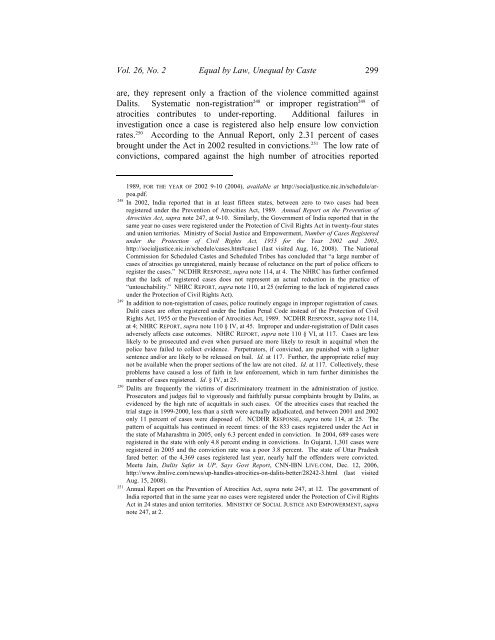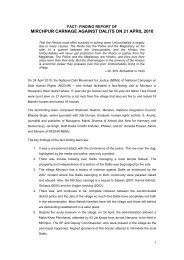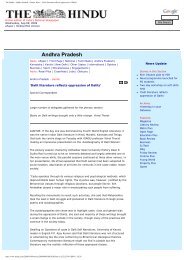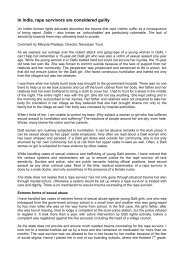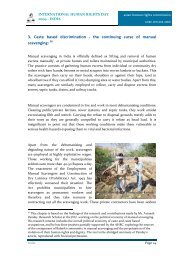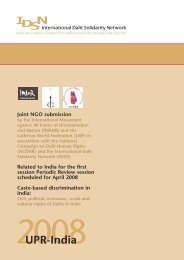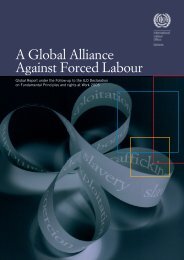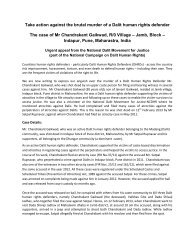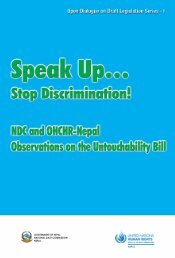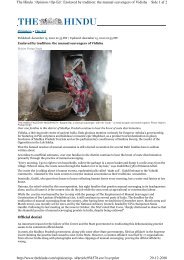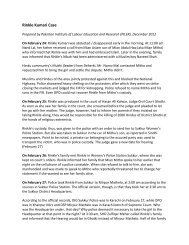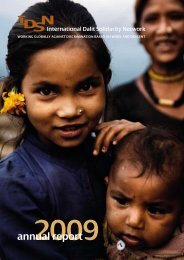equal by law, unequal by caste - International Dalit Solidarity Network
equal by law, unequal by caste - International Dalit Solidarity Network
equal by law, unequal by caste - International Dalit Solidarity Network
You also want an ePaper? Increase the reach of your titles
YUMPU automatically turns print PDFs into web optimized ePapers that Google loves.
Vol. 26, No. 2 Equal <strong>by</strong> Law, Un<strong>equal</strong> <strong>by</strong> Caste 299are, they represent only a fraction of the violence committed against<strong>Dalit</strong>s. Systematic non-registration 248 or improper registration 249 ofatrocities contributes to under-reporting. Additional failures ininvestigation once a case is registered also help ensure low convictionrates. 250 According to the Annual Report, only 2.31 percent of casesbrought under the Act in 2002 resulted in convictions. 251 The low rate ofconvictions, compared against the high number of atrocities reported1989, FOR THE YEAR OF 2002 9-10 (2004), available at http://socialjustice.nic.in/schedule/arpoa.pdf.248 In 2002, India reported that in at least fifteen states, between zero to two cases had beenregistered under the Prevention of Atrocities Act, 1989. Annual Report on the Prevention ofAtrocities Act, supra note 247, at 9-10. Similarly, the Government of India reported that in thesame year no cases were registered under the Protection of Civil Rights Act in twenty-four statesand union territories. Ministry of Social Justice and Empowerment, Number of Cases Registeredunder the Protection of Civil Rights Act, 1955 for the Year 2002 and 2003,http://socialjustice.nic.in/schedule/cases.htm#case1 (last visited Aug. 16, 2008). The NationalCommission for Scheduled Castes and Scheduled Tribes has concluded that “a large number ofcases of atrocities go unregistered, mainly because of reluctance on the part of police officers toregister the cases.” NCDHR RESPONSE, supra note 114, at 4. The NHRC has further confirmedthat the lack of registered cases does not represent an actual reduction in the practice of“untouchability.” NHRC REPORT, supra note 110, at 25 (referring to the lack of registered casesunder the Protection of Civil Rights Act).249 In addition to non-registration of cases, police routinely engage in improper registration of cases.<strong>Dalit</strong> cases are often registered under the Indian Penal Code instead of the Protection of CivilRights Act, 1955 or the Prevention of Atrocities Act, 1989. NCDHR RESPONSE, supra note 114,at 4; NHRC REPORT, supra note 110 § IV, at 45. Improper and under-registration of <strong>Dalit</strong> casesadversely affects case outcomes. NHRC REPORT, supra note 110 § VI, at 117. Cases are lesslikely to be prosecuted and even when pursued are more likely to result in acquittal when thepolice have failed to collect evidence. Perpetrators, if convicted, are punished with a lightersentence and/or are likely to be released on bail. Id. at 117. Further, the appropriate relief maynot be available when the proper sections of the <strong>law</strong> are not cited. Id. at 117. Collectively, theseproblems have caused a loss of faith in <strong>law</strong> enforcement, which in turn further diminishes thenumber of cases registered. Id. § IV, at 25.250 <strong>Dalit</strong>s are frequently the victims of discriminatory treatment in the administration of justice.Prosecutors and judges fail to vigorously and faithfully pursue complaints brought <strong>by</strong> <strong>Dalit</strong>s, asevidenced <strong>by</strong> the high rate of acquittals in such cases. Of the atrocities cases that reached thetrial stage in 1999-2000, less than a sixth were actually adjudicated, and between 2001 and 2002only 11 percent of cases were disposed of. NCDHR RESPONSE, supra note 114, at 25. Thepattern of acquittals has continued in recent times: of the 833 cases registered under the Act inthe state of Maharashtra in 2005, only 6.3 percent ended in conviction. In 2004, 689 cases wereregistered in the state with only 4.8 percent ending in convictions. In Gujarat, 1,301 cases wereregistered in 2005 and the conviction rate was a poor 3.8 percent. The state of Uttar Pradeshfared better: of the 4,369 cases registered last year, nearly half the offenders were convicted.Meetu Jain, <strong>Dalit</strong>s Safer in UP, Says Govt Report, CNN-IBN LIVE.COM, Dec. 12, 2006,http://www.ibnlive.com/news/up-handles-atrocities-on-dalits-better/28242-3.html (last visitedAug. 15, 2008).251 Annual Report on the Prevention of Atrocities Act, supra note 247, at 12. The government ofIndia reported that in the same year no cases were registered under the Protection of Civil RightsAct in 24 states and union territories. MINISTRY OF SOCIAL JUSTICE AND EMPOWERMENT, supranote 247, at 2.


